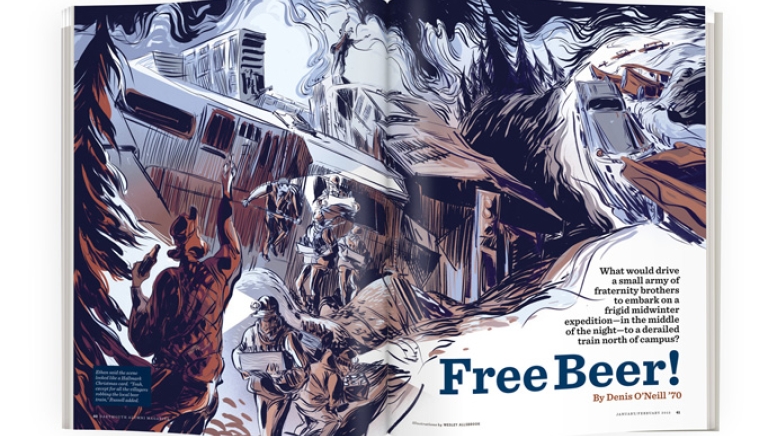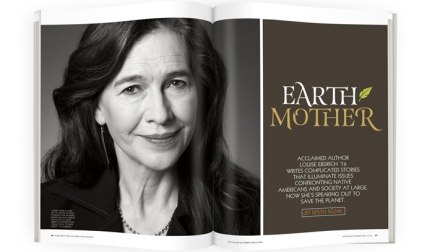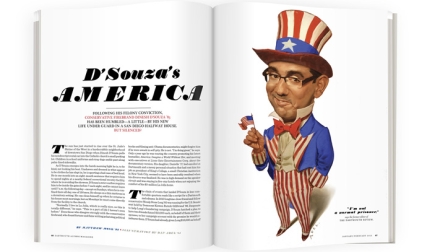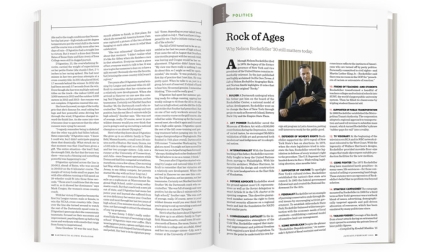At 35 degrees below zero, absolute temperature, packed snow squeaks like Styrofoam when you step on it. Your nostrils stick together with every inhalation. Your urine, should you be foolish enough to attempt to write your name in the aforementioned snow, would offer a halo of steam above its golden rainbow and be virtually frozen upon touchdown. Danny knew this because he had experienced all of the above during the severe February 1968 cold snap that contributed to the derailing of a freight train seven miles north of Hanover. It was an event that, in turn, led to one of the greatest spontaneous special operations ever launched by Greek society—an operation with proud linkage to the legendary 10th Mountain Division of WW II, the trailblazers in mountain terrain and cold weather warfare founded by Dartmouth students and alums.
Either the rail line that ran along the Connecticut River somehow cracked under the unrelenting frigid temperatures or the severe cold caused a rockslide or tree-fall that disrupted the tracks. The upshot was this: A 28-car Boston & Maine freight train headed north for Montreal, including at least two freight cars loaded with Schlitz and Miller High Life beer, overturned in the dead of night not far from Fairlee, Vermont.
It’s hard to explain how word spread as quickly as it did in a time before cellphones. Pay phones rang in dormitories and fraternities. Doors were banged on. The sound-asleep were awakened. Cold weather boots, mittens, snowmobile suits and ski gear were quickly assembled. War plans were hastily drawn up in fraternity basements. Maps of the Vermont countryside were taped to walls. The location of the derailment was pinpointed. Within hours of first alert, convoys of cars had pulled out of every fraternity and most dormitories and crossed the Connecticut River toward Norwich, Vermont. From there it was an upriver shot along a country road that looked like an Olympic toboggan run—every turn and straightaway bounded by 6-foot banks of plowed snow.
The plan at Heorot was a pincer movement. The main convoy consisted of three vehicles spearheaded by Bags’ Ford station wagon—with Jeb riding shotgun. Dromio’s 1957 pale yellow, four-door DeSoto sedan, with its TorqueFlite, three-speed, push-button automatic transmission and roomy trunk, fell in behind Bags. Danny and his roommates Ethan and Russell provided rear-guard action in Russell’s forest green Mustang.
Henry was the lone element in the eastern flank of the attack. His farmhouse, in Lyme, sat on the New Hampshire bank of the Connecticut River. After studying the topo map someone had dug up to help coordinate Heorot’s mission, Henry realized his house was virtually adjacent to the scene of the derailment, if separated by a body of frozen water. The terrain, however, was flat—something the Vermont side was not. There was a river to be crossed, but Henry calculated that with the recent below-zero readings there ought to be a sufficient thickness of ice to allow him to come in from the New Hampshire side.
Ethan said the scene looked like a Hallmark Christmas card. “Yeah, except for all the villagers robbing the local beer train,” Russell added.
The scene of the derailment was easy to find. The road climbed a long, gentle rise that took it 100 yards away from the river. At the crest, dozens and dozens of cars were pulled over tight to the plowed snowbank. Some sported roof racks already piled high with cases of beer. When Danny, Ethan and Russell parked where they could and walked to the crest, the snow squall they encountered leaving Hanover had blown through, revealing a coal-black sky crackling with stars. Packs of locals and fraternity brothers were already hard at it—trekking down and back up the steep, open slope to the toppled freight cars, visible in a copse of winter-bare birches at the edge of the frozen river. The cars looked like beached whales. The river itself formed a ghostly, white ribbon behind the derailment.
A line of torches illuminated a zigzag trail from the road to the rail line, where a dozen powerful portable lights lit up the freight cars. The torches also served as something of a slalom course for brothers who made the descent on skis and toboggans—some wearing headlamps that carved fleeting, Zorro-like punctuations in the darkness with each turn. Danny, Ethan and Russell couldn’t help but admire the ingenuity and scope of the operation. And the beauty. Ethan said it looked like a Hallmark Christmas card. “Yeah, except for all the villagers robbing the local beer train,” Russell added.
Truth is, the legality of the heist ceased to be an issue after some brother in some house explained the laws of salvage at sea, and pronounced with great certainty—if no exact legal precedent—that overturned freight cars were the equivalent of shipwrecks…especially when encountered on the bank of a navigable body of water (such as the Connecticut River, icebound or not). Whoever got the first line on them owned them. Which explains how salvage, not theft, became the operative explanation for what was taking place.
Across the river Henry stepped out of the back of his snow-coated, 19th-century farmhouse dressed in a camouflage snowmobile suit. His ever-present 35mm Nikon camera hung on a strap around his neck. A headlamp snugged his ski cap to his head with an elastic band. He stepped into snowshoes, tied the towrope to his four-man toboggan around his waist, grabbed his cross-country ski poles and headed for the river’s edge. On the far side of perhaps a quarter mile of windswept ice, dozens of flashlight beams danced around the dark shapes of the overturned cars. Higher up, the torches glowed in the steep meadow—looking like a night skiing operation at a mom-and-pop T-bar slope.
Henry tromped about halfway across the river before stopping to take stock. The ice was free of snow in patches, covered elsewhere with uneven amounts. It was easy walking, as he knew it would be. The prospect of free beer warmed him as much as the exertion. Only the tiniest, niggling fear of falling through and drowning beneath a ceiling of ice with zero possibility of rescue or escape kept him from outright euphoria. If he went in, no one would likely ever know…until his body washed up against the concrete face of the Wilder Dam below Norwich…when the ice melted…if his body even made it all those miles without snagging on a sunken tree or rock ledge.
At the top of the meadow above the derailment several cases of beer were wedged into the snowbank—there for all to sample—while the brothers of Heorot gathered to debate their tactics. Bags, who had put on almost 20 of the 40 pounds he needed to disqualify himself for service in the U.S. military, watched three or four brothers from another fraternity stagger up the final yards of the steep slope with three cases of beer on their shoulders. They were red-faced, sweating, puffing hard with the exertion. “Boys,” Bags said, “I can’t do that. I can’t be taking weight off. Not with the draft number I got.” He finished one beer and reached for another. “This part I can do.”
Danny studied one fraternity, which had strung out almost 30 brothers from the boxcars to the crest of the hill to form a long chain.
Heorot didn’t have that kind of manpower. Another fraternity had brilliantly commandeered a local tow truck with a winch. The tow boom angled out over the bank like a fishing rod. The tow cable extended as far down the hill as it would go, where it was augmented by a 100-foot length of rope. All the brothers had to do was load a toboggan with beer, secure it, walk it 20 or so yards up to the end of the rope, affix the toboggan and signal the tow truck operator with a flashlight to hoist her up.
Russell evaluated possible strategies. The snow was a yard deep in places, with deeper drifts visible. He said to no one in particular: “Man, a lot of work—even for free beer.” He asked Bags how much rope he had. Bags told him he had brought everything he could find in the basement—maybe a couple hundred feet. Danny, Russell knew, had grabbed four or five fire escape ropes from the fourth floor of New Hampshire Hall. Russell calculated them to be good for another 200 feet or so. A few yards away a carload of Phi Delta brothers finished piling a car roof so high with cases that the wheel wells practically touched the tires. “Dromio, get your car,” Russell barked. “Ethan, Danny, save the spot that’s opening up.” Russell ran off down the hill toward his car.
Minutes later Dromio had filled the vacated spot with his DeSoto. Russell pulled up in his Mustang. He double parked beside the DeSoto and climbed out. He took the five fire ropes from the trunk of his car, tied them together and added them to the rope Bags had brought from Heorot, coiling the ever-growing line in the snow as he worked.
“Bags, go get your toboggan.”
Bags balked. “That’s a 45-calorie round-trip,” he said to Russell.
“Oh, for God sakes….”
“I’ll get it,” Jeb chimed in, and ran off.
Moments later Jeb was seated in the front pilot’s seat of the toboggan, which was precariously balanced atop the snowbank, aimed downhill. Russell planted himself in the snow beside the toboggan to prevent it from slipping away prematurely. Jeb’s short legs were folded under the curved front. Ethan, Danny and Dromio took their places behind him, locking their legs around the waist of the man directly in front.
Russell handed one end of the rope to Dromio—the caboose in the lineup. “Hold this until it goes taut, then let go. It should be close to the bottom. Load up the toboggan, tie it to the end of the rope and yank three times on the rope. We’ll get it up the hill, unload it and send it back down again unmanned, attached to the rope. Free beer, boys. Time to go get some. Jeb, you ready?”
Jeb was wearing his trademark, wool-lined, WW I leather cap with earflaps. He lowered ski goggles over his eyes. “The Flyin’ Ace is ready.” “Good luck, boys,” Russell said. “We’re going to remember this night for the rest of our lives.”
With that he tilted the toboggan slightly forward until it glided away from the crown of the bank. Bags kept tension on the rope and paid it out little by little, until he was sure the toboggan was aimed properly and the coils were clear. Then he let go, sending the crew off with a whoop, the coiled rope flying out of the snow at his feet as if attached to a harpooned whale.
As luck would have it, Henry was there to witness the crash landing. He recognized Jeb’s trademark rugby howl before he picked up the dark blur of the toboggan. Jeb, for his part, was sizing up an exit strategy. Time was of the essence, seeing as he was closing in on the side of a stationary, steel freight car aboard a snow craft with no brakes and limited turning ability. “Drag your hands,” he shouted over his shoulder. His passengers complied, but it was too little, too late. The toboggan hit the end of the rope—yanking the end of the rope from Dromio’s grasp as planned. The freight car loomed larger and larger—impact was seconds away.
“Bail left!” Jeb screamed. The toboggan hit a bump virtually as he said it. The men of Heorot leaned left, and the airborne toboggan hit the soft snow sideways at about 30 miles per hour. Contact sucked them off the wooden missile. The toboggan nose-dived, cartwheeled once, then spurted up—sailed maybe a yard from Henry’s head—and slammed into the side of the freight car: CLANK. The passengers tumbled in the deep snow, legs and arms entangled. When they came to a stop, they were all face planted. One by one they rolled onto their butts. They were too stunned to speak. Jeb settled onto his knees and took in the carnage. His face and goggles were covered with snow. The flaps of his pilot’s cap were akimbo. He wiped a mitten across his mouth and shoved his goggles onto his forehead. Danny, Ethan and Dromio gathered themselves. Each looked as if he had taken a cream pie in the face. “Okay, boys,” Jeb said, swagger undented. “We’re here.”
Henry hustled over, saw that they were unhurt and snapped a few flash photographs. “Everybody okay?”
Danny was relieved to be unbroken. Dromio peered into the darkness to see if he could spot the rope. He didn’t exactly see the end, but he made out the taut, dark line it made against the snow, angling back up the hill.
Henry sighed. “I wish I’d gotten the airborne shot.” Danny asked him how the river was. Henry smiled. “Frozen.”
Dromio’s DeSoto played a role in the beer retrieval that combined Detroit design excellence with New England ingenuity. When the boys had loaded the toboggan with as many cases as they felt it could safely transport—secured with bungee cords—they pushed it up the hill to the end of the rope. Jeb tied the toboggan to the rope and gave it three tugs.
The dean made his rounds to all the fraternity houses after hearing from an executive at the Boston & Maine Railroad Co.
They worked for four hours. Henry made three round trips across the river. Dromio filled his DeSoto—roof and trunk—until the chassis sagged under the weight. Russell put the top down on his convertible Mustang so they could pile cases of beer all around Ethan, who drew the back seat short straw. It was a slower ride home.
At first light the country road was devoid of parked cars, the meadow empty of students. All that remained was a Vermont country slope that appeared to have been groomed by convoys of snow cats. A couple of crows, bulky with winter-fluffed feathers, squawked from the limbs of birch trees along the rail bed. The morning sun reflected off the steel sides of the derailed freight cars. The doors were open. The cars were empty, echoing a wintry homage to another Greek pillaging—the frenzied denuding of Zorba’s house following his death. A lone toboggan track led from the site, across the frozen Connecticut River—ski pole divots visible to either side—appropriately enough (given their maker) looking like the sprockets of 35mm film.
The dean made his rounds to all the fraternity houses after hearing from an executive at the Boston & Maine Railroad Co. that thousands of cases of beer being transported in two of their freight cars had been stolen in the middle of the night, following a derailment, with some evidence to suggest that students at Dartmouth College may have had a hand in the heist. A lover of all things Dartmouth—let alone the unfettered Dartmouth spirit—the dean felt more sad than angry.
He paused briefly in front of Heorot to watch Jeb, Mugsy, Bad and Darren put the finishing touches on an igloo destined to be the fraternity’s entry in the fast-approaching Winter Carnival ice sculpture competition. The name “HEOROT” had been molded onto a block of hard-packed snow that sat atop the classic igloo tunnel entrance. Two steins of beer with overflowing foam heads were formed in similar bas-relief in the ice-glazed block below the name—a reminder of the house’s literary origins as the mead-hall in Beowulf.
Inside the fraternity the dean met with Bags, the house president, and Kendall, its social secretary. The dean explained he was making rounds of all the fraternities—the reason being a call from the Boston & Maine Railroad Co.—and shared his dismay that Dartmouth students might have been involved in the theft. “And it was theft, not salvage,” he said pointedly, preemptively, clearly bristling from too many attempts by too many fraternity presidents to employ that defense. “The tracks were private property. When you take something from private property without the owner’s permission, it’s theft!” He hoped no Dartmouth fraternity had been involved—at least not all of them—and that Heorot might fall into the latter category. “This is a serious matter,” he told the boys. “The train company is not amused and neither am I. I’m disappointed.”
Bags told the dean that he had heard of the derailment—as everyone had. By way of reassurance (rather than outright denial), he offered to walk the dean around the house on an unannounced inspection. They started in the attic, worked their way through the second-floor bedrooms—all of which were devoid of beer—and finished in the basement, where the dean saw only half- and quarter-kegs of beer lining the hallway to the kitchen.
The dean paused once more on the way out, to admire the igloo. He wanted to be able to say something positive. “Glad to see your fraternity competing once more in the Carnival ice sculpture contest,” he told the brothers.
“We thought it was time to get back in the spirit,” Jeb told him. “Senior year and everything.”
He reached into a bucket of slush, added some snow from the ground and packed the cement-like concoction into a crack between ice blocks as the dean, heavy-hearted, headed for his next fraternity. It’s a good thing he didn’t ask for a tour of the igloo. If he had crawled through the 8-foot, arched tunnel into the central space he would have encountered some 90-odd cases of Miller High Life—most recently stacked in freight cars headed up the Connecticut River, bound for Montreal.
Denis O’Neill has worked as a journalist, short story writer and writer/producer of public television. He is the author of Whiplash: The Way We Were When the Vietnam War Rolled a Hand Grenade into the Animal House. His website is whiplash-the-book.com.




